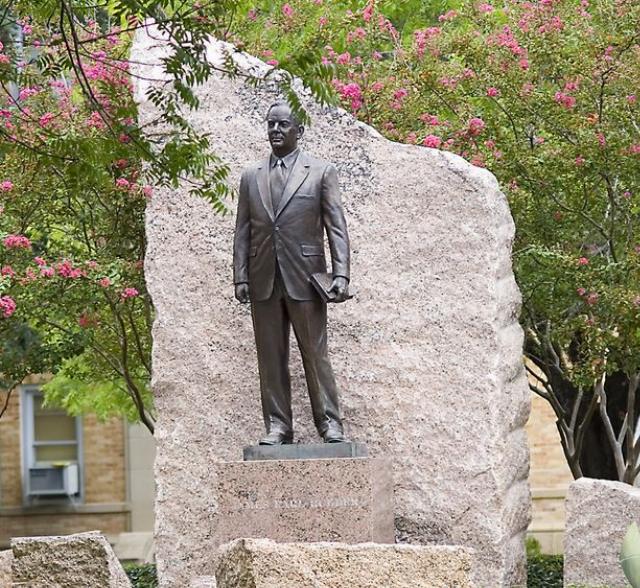D-Day’s James Earl Rudder, a hero for the ages
We all know Gen. Dwight Eisenhower’s command performance on D-Day.
With his firm grip on the tiller of strategy and secrecy, the Allies stormed France on June 6, 1944, on the way to victory over the Nazis 11 months later.
What many of us don’t know is a mighty hero in Ike’s ranks.
His name was James Earl Rudder, an Army lieutenant colonel whose scaling of the Pointe du Hoc cliffs helped turn the tide of the biggest amphibious invasion in history.
Omar Bradley, Ike’s top general at Normandy, knew exactly Rudder’s crucial role, writing: “No soldier in my command has ever been wished a more difficult task than that which befell the 34-year-old commander of the Provisional Ranger Force.”
Rudder’s triumph high above the northwest coast of France was an uppercut to the Germans from the west as the Russians rushed from the east.
Patrick O’Donnell, author of the Ranger-filled “Dog Company,” is in awe of Rudder: “Pure leadership. He was a leader of men. He had mental toughness. He was determined. It was in his DNA. And to think the whole operation might not have succeeded if he had not been there.”
Douglas Brinkley, author of “The Boys of Pointe du Hoc,” put it this way: “James Rudder was the best of the U.S. military tradition. As an officer, he was one with his men. He was the perfect leader. This was a man who went on a suicide mission, and it’s one of the most remarkable stories of World War II. He told his men they had a 50% chance of making it alive. And when his superiors told him not to go himself, he insisted. No way would he send them on that mission and not put his own life on the line.”
Thomas Hatfield, author of “Rudder: From Leader to Legend,” also raves: "He was one of the greatest citizen soldiers. The greatest, of course, was George Washington, who left the Army after the Revolution and returned to farming. Rudder was a reservist. He didn’t make the Army a career. He wanted to return to civilian life for two reasons: an attachment to his mother and an attachment to Texas, to ranching. He was a man of the soil.”
Image: Stuart Seeger (cropped), via Flickr // CC BY 2.0 DEED
When Rudder retired from the Army Reserve in 1967, while president of Texas A&M University, he was a major general whose top decoration was the Distinguished Service Cross, a military award second only to the Medal of Honor.
Rudder almost died on that Longest Day 80 years ago. He was wounded twice at the Pointe, once by a bullet in his calf and minutes later when an explosion fired cement fragments into his chest and arm.
Meanwhile, as Rudder’s Rangers ran into a Nazi gantlet above the English Channel, “he had to cope with the unknown,” said Hatfield. “He and his men were cut off, isolated. They had no communication with commanders at sea. They didn’t know the outcome of the invasion. Yet Rudder was steadfast without knowing when relief was coming. He remained calm, a dedicated leader. Some of his men told me they were better soldiers with him than at other times. That’s because he was consistent, whatever the circumstances. He was always the same, authentic leader — and with him, his men knew the mission came first.”
James Earl Rudder (1910-70) developed his traits growing up poor in tiny Eden in central Texas.
By early 1944, Rudder was in England and received details of the mission, wrote Brinkley: “The Rangers’ task: climb the cliffs and destroy the Nazi concrete bunkers 4 miles west of Omaha Beach on the Normandy coast. From their jutting crow’s nest, the Germans could inflict great damage to the Allies’ armada of over 5,000 ships.
“To neutralize these enemy guns, this elite group of about 225 2nd Ranger Battalion volunteers — Rudder’s Rangers — had to surprise the enemy by scaling the 100-foot-tall promontory, even while under a barrage of Nazi fire coming from a concrete observation post. It was a daunting assignment.”
To say the least. One naval officer said flatly, “It can’t be done. Three old women with brooms could keep the Rangers from climbing those cliffs.”
The Nazis had something much deadlier: the MG 42, a savage machine gun called the Bonesaw. Rudder and his men still climbed with rope hung from hooks shot up the Pointe.
“By June 8,” wrote Brinkley, “the Americans were victorious at the Battle of Pointe du Hoc, raising the Stars and Stripes on the promontory. They had suffered 70% casualties. Yet their mission had been a military success.”
Thanks much to Earl Rudder, the Titanic Texan.
Makes you proud to be an American.
Bucky Fox is an author and editor in Florida.






